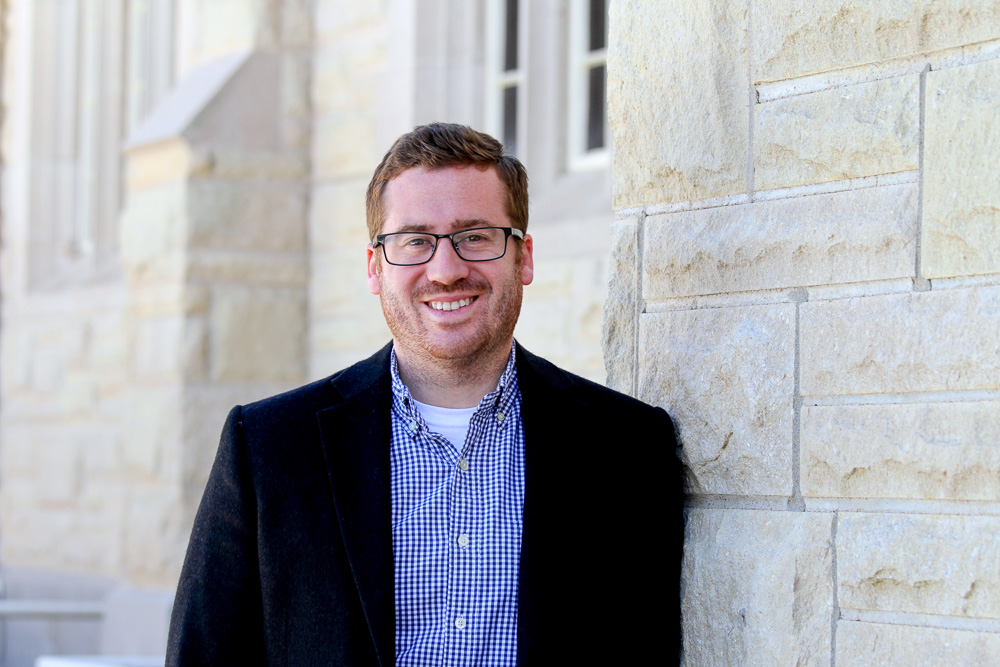John Tyson, a pastor at Bethel College Mennonite Church in North Newton, Kansas, graduated from Eastern Mennonite University (EMU) in 2009 with a bachelor’s degree in Biblical studies. He then attended Princeton Theological Seminary, where he received a Master of Divinity in 2014.
Describe your field of study and research at Princeton Seminary.
My course of study primarily centered around Christian ethics and political theology, which was a continuation of work that I began at EMU. I narrowed my research focus more specifically to topics of theology, social justice and citizenship. I am passionate about how Christian faith can help energize the practices that are essential to an inclusive and pluralistic democratic society.
The Christian theological virtues of love, hope, faith, forgiveness, and peace continue to have vital importance in our current political discourse. In my research, I weighed Anabaptist theology together with a range of voices in theology and political theory in search of common ground on these issues. This research eventually led me to the practice of broad-based community organizing, where I encountered an inclusive and pluralistic democratic practice that empowers ordinary citizens to articulate and achieve the common good for their communities. My primary research project as a student at Princeton Seminary displayed how Anabaptist theology intersects with this kind of political engagement and contributes to visions of the common good for all people.
What do you think makes EMU graduates distinctive?
EMU graduates seem to demonstrate a commitment to engaging the world with integrity. They hold fast to values of peacemaking, service, social justice and faithfulness that emanate from the core of their experience at EMU and it shines through their work in the world. Oftentimes I’ve witnessed these values on display in simple and ordinary interactions – between a principal and student, between a social worker and someone in need, between a pastor and congregant. The examples are endless. EMU graduates are making an impact in the world – and for the common good!
How did your academic studies and professors at EMU prepare you for your graduate studies and/or current work?
I am endlessly grateful for how my total experience at EMU prepared me for graduate work and beyond. My academic experience in the Bible and Religion Department was exceptional. Professors were invested in me not only as a student, but as a person. There wasn’t a single occasion in my four years at EMU when a professor wasn’t willing to take an extra question from me or sit down for conversation after class. Studying in that type of supportive environment instilled in me the confidence necessary to pursue graduate work in a rich academic setting. Once I was there, I drew on my EMU experience to thrive as a reader, writer, and aspiring leader.
What do you think made your application to graduate school stand out among others?
I believe the wide variety of courses that I participated in at EMU stood out on my application. Even as a Biblical studies major, I had opportunities to study theology, religion, ethics, and philosophy just in the Bible and religion department alone. It was clear that I would be entering graduate school with a wide-ranging academic background and prepared to succeed in the program.
What attracted you to attend EMU as an undergraduate?
As my high school career ended, I began to develop interests in theology and politics. I was new to Anabaptist Christian faith at the time and eager to find a place where I could continue nurturing my newfound curiosities. With those interests in mind, EMU emerged as an ideal setting for me to deepen my study of theology and politics. Beyond academics, I was drawn to the beautiful landscape of the Shenandoah Valley and the social justice ethos in the student body.
What are some favorite memories of your time at EMU?
My favorite experience was participating in the Middle East cross-cultural. Talk about an opportunity to study theology and politics! It was truly a gift to share this extraordinary time of learning alongside many wonderful peers who themselves were deeply engaged in all that the experience had to offer. My other favorite memories were more on the ordinary side: going to the “caf” with hallmates, cheering on sports teams, late-night conversations, and developing friendships with remarkable people.

When visiting my home church of Bethel College Mennonite, I have heard John preach some excellent sermons!
We are so happy he chose BCMC as our pastor. All you said in the Q & A rings true in your fine sermons
Very complimentary comment on education experiences at EMU and Princeton. Am so encouraged that our good Mennonite men and women choose to pastor local congregations. It is such a critical leadership link between primary family and next generation.
Now after having an elite academic education, I would be interested in also hearing what Pastor Tyson views as his primary and core purpose in investing his time and energy as pastor of a congregation? Peace, justice, getting along are so noble goals at home and abroad, BUT in the end there remains DEATH/JUDGMENT/GOD. Does this inevitable stare all of us in the face in our more sober moments? The role of pastoral leadership is God given and divinely ordained. God bless you John Tyson and your Kansas congregation of Mennos!!